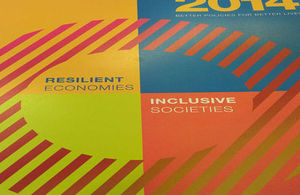Inclusive growth on the agenda for OECD Ministers
OECD Week, which ran from 5 to 7 May, welcomed Ministers and civil society representatives from OECD countries and beyond.

OECD MCM 2014
The Ministerial traditionally sets the scene for the OECD’s work in the coming year. UK Minister for Universities and Higher Education David Willetts, and Minister for Skills and Enterprise Matthew Hancock, attended to discuss how we can work together to support inclusive growth and develop resilience.
Chaired by Japan, with the UK and Slovenia as joint vice-chairs, the theme of this year’s Ministerial Council Meeting and Forum was “Resilient economies; Inclusive Growth”. This theme challenged our traditional understanding of economic stability and asked us to consider what we have learnt from the global economic crisis and to consider how we can use that knowledge to foster more inclusive growth in the future.
The OECD’s Economic Outlook was launched at the Meeting and growth figures from it were top of the headlines in the UK. UK growth is predicted to be 3.2% in 2014, up from 2.4% six months ago - the highest upgrade of all G7 countries.
The Ministerial meeting itself was opened by Japanese Prime Minister Shinzo Abe who set the tone, outlining the economic challenges for Japan and much of the globe, calling the OECD “the most influential thinktank in the world”.
Ministers from OECD Member States, accompanied by their counterparts from South East Asia, formally launched the South East Asia regional programme. The programme seeks to bring counties from the region closer to OECD practices and standards, allowing them to make use of OECD expertise while at the same time sharing their knowledge with OECD countries.
The rest of the programme covered a range of issues, including considering the OECD’s work on New Approaches to Economic Challenges, building resilience through skills and entrepreneurship, and promoting ‘greener growth’. Ministerial representatives from OECD countries then went on to agree a ground-breaking statement on climate change. Ministers agreed to draw on OECD knowledge in the effort to limit global temperature rises to less than two degrees. On day two, Ministers discussed using the OECD as a place for development expertise and providing technical support on post-2015 development goals and the OECD’s trailblazing work on understanding trade links and the role of services in growth.